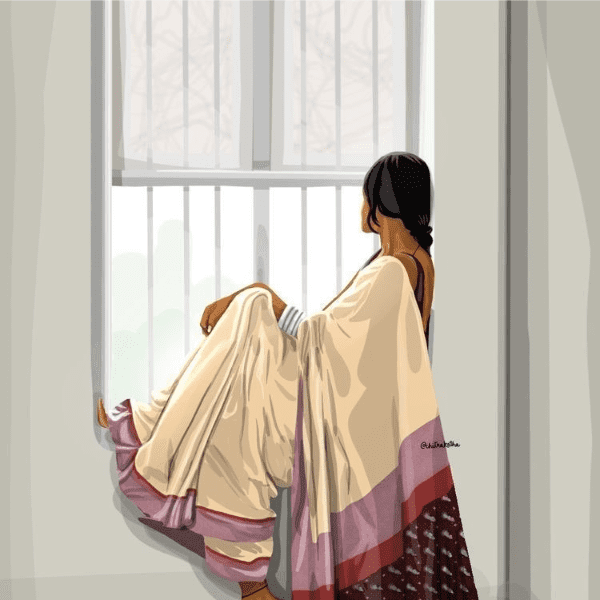India is a land of diverse traditions. These traditions, marked by their beauty and significance, play a crucial role in shaping the identity and lifestyle of its people. Here we ask, where do women take space within the world of vibrant Indian traditions?
Let’s start with the concept of home which is close to home for every woman.. Their paternal home is deemed ‘paraya‘—belonging to someone else—while their in-laws’ home remains a place where full claim is often not granted. This dichotomy creates a narrative where a woman finds herself without a true sense of belonging, security and stability; I can be cast out anytime as it is not actually my home? This nature of the concept of home leaves many women in India caught between two worlds. The paternal home, despite being the place of her upbringing, is not the place she belongs, while the in-laws’ home may not offer the autonomy and belongingness that would typically be associated with one’s dwelling. So, where does the woman derive a sense of belonging? Here the struggle to establish her identity within the pull of In- laws’ and birth home becomes apparent.
The phrase ‘Beti Paraya Dhan Hai’ —Daughter is someone else’s wealth—woven into the cultural fabric, reduces women to mere wealth and their identity to possession, reinforcing the idea that her true belonging lies elsewhere, contributing to her sense of invisibility.
Pregnancy is frequently perceived not only as a biological process but also as a significant social and cultural event, shaping the identity and role of women within the community. Godhbharai, also known as the baby shower or the ceremony of filling the lap, is a traditional Indian ritual that celebrates the expectant mother. While on the surface, this ceremony appears to honor the woman and her impending motherhood, a closer look reveals the complexities surrounding the perception of women during pregnancy.While Godbharai is meant to celebrate the arrival of a new life, it often inadvertently diminishes the woman carrying this life. The focus on the unborn child eclipses the woman’s strength, sacrifices, and the profound journey of motherhood she embarks upon, leaving her invisible within the joyous ceremony. This is just the beginning.
The minimization of pregnancy as a process becomes evident as the ceremony revolves around gifts, blessings, and rituals directed predominantly towards the baby. The woman, the vessel for the developing life, often finds herself overshadowed by the social anticipation and celebration of the child. This phenomenon reflects a larger societal tendency to emphasize the maternal role primarily in relation to the child, many times neglecting the woman’s individual experience, challenges, and identity during pregnancy. The cultural narratives surrounding pregnancy also extend to postpartum. The emphasis on the child’s arrival may inadvertently downplay the significant physical, emotional, and social changes that women undergo during and after pregnancy.
In various aspects of life, women in India find themselves navigating a complex web of customs and traditions. Despite strides in education and employment, deeply ingrained societal expectations often cast a shadow over their roles and contributions, perpetuating traditional beliefs that confine women to predefined roles. In familial structures, the pressure to prioritize the family’s needs and adhere to established norms obscures their individual identities. The workplace presents its own challenges, with gender biases diminishing the visibility of their achievements. Social expectations around appearance and behavior further restrict women’s freedom, concealing their authentic selves. Intersectional challenges add layers to this invisibility, as factors like caste and religion compound the struggles faced by different groups of women.
*Picture Credits: Chitrakala
